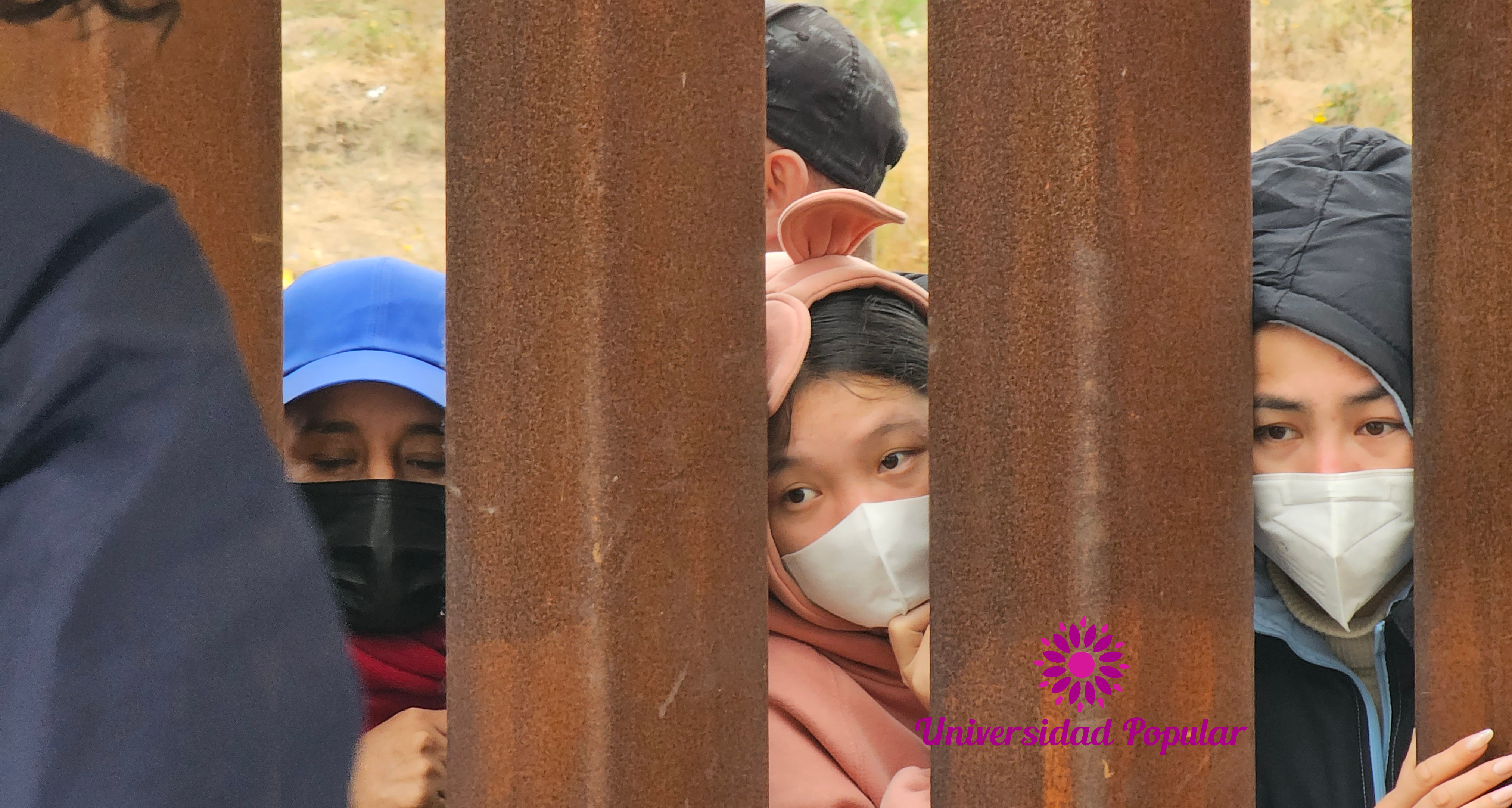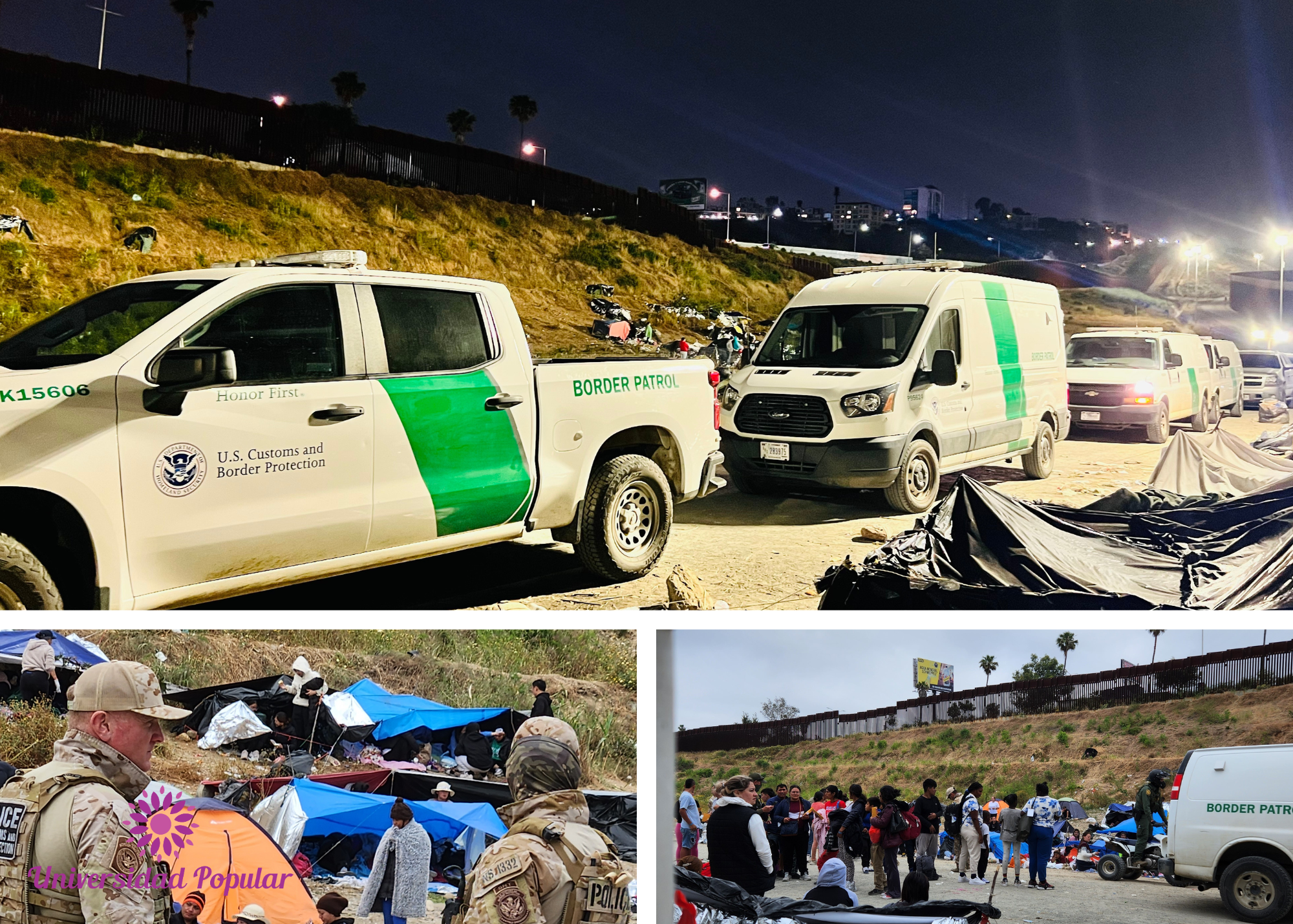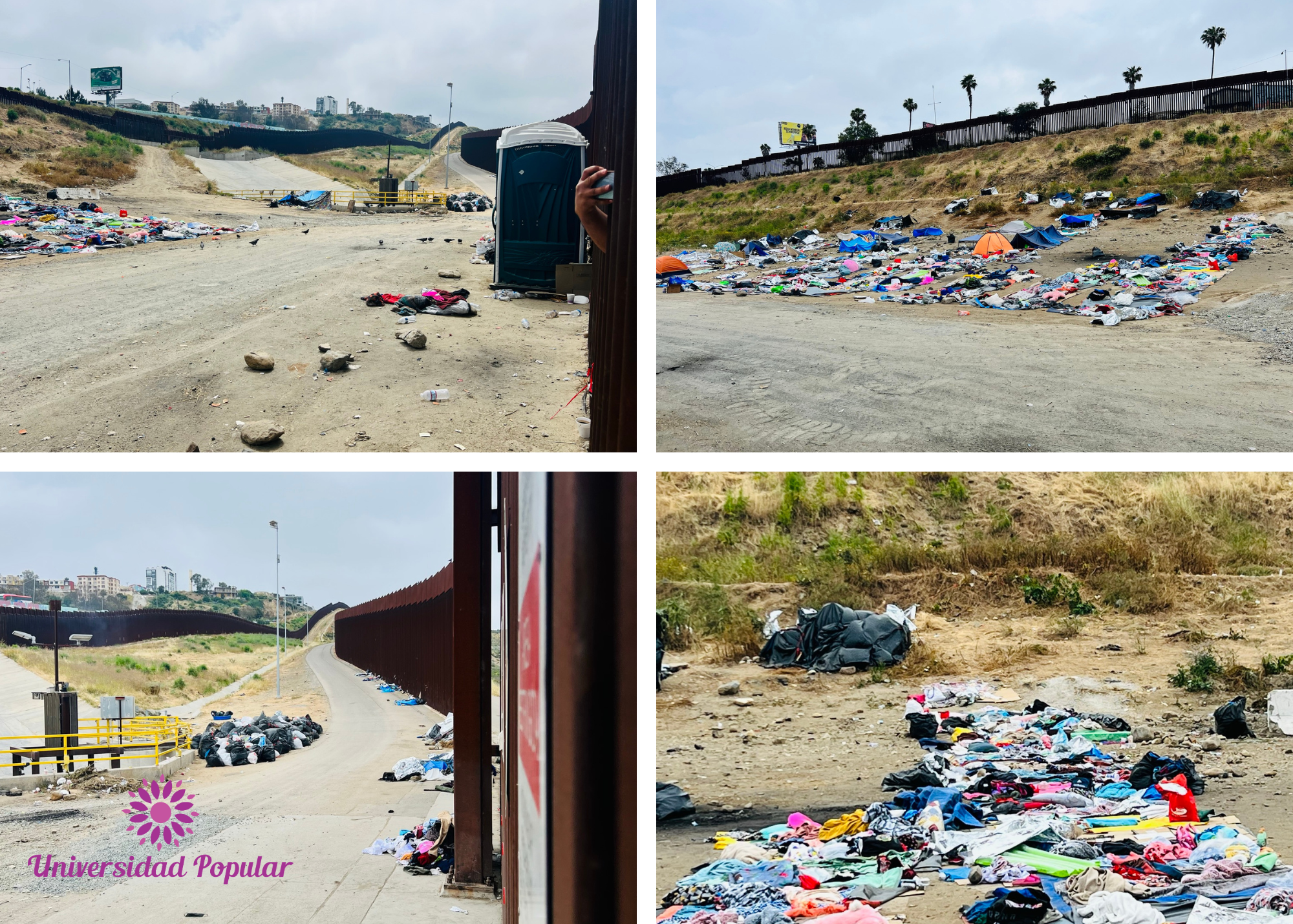Our team at Universidad Popular dedicated the last four weeks mobilizing collaborators and resources to provide emergency humanitarian assistance to thousands of individuals and families detained on the U.S. side of the border wall in an open air facility commonly referred to as Whiskey 8 in San Ysidro and in Jacumba, California. Below is our firsthand account.

Human Dignity Violated on U.S. Soil
¡Agua, Agua por favor!
“¡Agua, Agua por favor!” implored a young man gasping for air as he pressed his face against the steel. “¡Acabamos de llegar mis compañeros y yo. Por favor. Por favor. Necesitamos agua!” His voice was breaking as his blistered lips uttered the word agua.

As though she had bionic hearing, Flower’s voice echoed louder than the competing cries and wrestling commands. “They just got across, give them water and food. They need blankets. The men are kept in the encampment above, about 40 minutes from here.” Her sternness shattered my panic.
I hurriedly grabbed as many bottles of water as I could get a hold of and quickly offered them across the fence to the familiar stranger who confided in me and talked to me like we had known each other our entire lives. Despite his accent, I understood his Spanish perfectly. I gave him oranges and apples. He walked away to huddle with the rest of his group, filled their backpacks and turned around heading back to the men’s campamento.

Another group came to the wall. Their dark eyes pierced through the rusting steel pollards like laser beams that cut through mountains and oceans. Never in almost fifty years of crossing the U.S.-Mexico border have I been face to face with such a beast that is our U.S. immigration system and its guards that feed it and protect it as they carry out the cruelest anti-migration policies without addressing the root causes of migration and the U.S. asylum system. CBP agents storm and stand around like Hitler's SS guards while children cry.

We witnessed first-hand thousands of men, women, children, and infants captured and corralled in between corroded 30-foot-high double steel walls, penetrable only when the gates are opened by the U.S. Customs and Border Protection (CBP) agents or migras. Deprived of food, water, shelter, medical care, hygiene products and bathrooms, people endured egregious, deplorable, and inhumane conditions, unquestionably in violation of many laws across jurisdictions, domestically and internationally. Robbed of basic human dignity, detaining people in these conditions is not only illegal, but also evil.
Our small but mighty team of human rights defenders stood dwarfed amid the magnitude of this unforgivable cruelty occurring in front of us on U.S. soil. There were more reporters and journalists than human rights defenders. Each one of us walked up to the wall and saw hundreds of people up close in agony. At first we had to walk away to regain our composure, suppress the flood of emotions and dry the tears that rolled down our cheeks uncontrollably. Even reporters arriving for the first time to cover the story broke into tears in the middle of their stories. It was too real, surreal and we couldn’t change the channel. We had no time to fall apart because we had to get to work.

When Maria and I arrived on Thursday, May 11, my compañeras y compañero - Flower, Angelica, and Francisco were in full response mode to the emergency. They joined our community partners, Adriana and Pedro from American Friends Service Committee (AFSC) and Nina with the Friends of Friendship Park group who regularly monitor the situation at the border and seamlessly formed an incident command team to address the emergency. They efficiently began organizing and mobilizing our trusted community networks to alert them to the situation and invited them to join us in solidarity. We most urgently needed food to feed the people, water, blankets, and phone chargers. As soon as the request for food reached comrades like Homayra from Partnership for the Advancement of New Americans (PANA), Tazheen from CAIR San Diego, Caroline from Pilgrim United Church of Christ, Lon, Nadia and Kandi from Asian Solidarity Collective (ASC), Laila, Malcolme, Michael, Irshad and Askari from Pillars of the Community, Jay from PPE Unite, Andre and Amy from AB Jones Co, and other friends, they immediately mobilized to get food and water to the border wall in San Ysidro and dozens of anonymous individuals not associated with organizations began arriving with food to feed hundreds of individuals who were dehydrated and famished.

As food was arriving, we had to organize a distribution system. We could have easily had a food riot due to the extreme level of desperation had it not been for the organizing skills and leadership on both sides of the fence. Upon contact with CBP, CBP would place a colored wristband on each person depending on the day of the week when the migrants entered Whiskey 8. Pedro and Adriana established a distribution and leadership system designed to ensure every colored wristband group, cultural and language group had a leader advocating for their community and ensuring every member received supplies. This level of organization worked to ensure a peaceful and orderly community-led organization for communication and supply distribution. From speaking with hundreds of individual migrants, we learned that they came from countries including Colombia, Venezuela, Peru, Ecuador, Brazil, Mexico, Haiti, Dominican Republic, Vietnam, Afghanistan, Iraq, Jamaica, Kazakhstan, Georgia, Russia, Turkey, India, Somalia, Cameroon, Ghana, etc.

About to confront the unimaginable, Maria and I heeded Flower’s urgent request to mobilize our networks and to bring blankets and phone chargers. We rushed to the Ross store nearby and bought all the blankets they had and started sending messages to family, friends and collaborators asking them for help. We reached out to our friends at Restoration Abby who without hesitation answered our call and mobilized their congregation to assist. Not only did they immediately deploy thousands of dollars to purchase emergency supplies but also committed to joining us to do night watch for the next four nights, until the last detained person was picked up and taken to the processing center. Accompanied by comrades including Eric, Marisol Libertad, Alex, Matthew, Richie, Danielle, Kelly, Abby, Rashad, Crystal, and Maria, Flower was the only individual who remained on site 24 hours per day from Thursday, May 11 to Monday, May 15. With the help of Restoration Abbey, we organized a team of dedicated defenders who signed up for overnight shifts providing support for detained individuals and monitoring CBP activity. Many individuals stopped by to bring supplies throughout the days.
As I approached the wall, I saw a small arm reaching through the fence calling me, “¡Hey muchacha, muchacha! ¿me puedes dar una cobijita? ¡Tengo frío! ¡Por Favor!” I looked back at her and saw mothers holding their babies tightly like mama kangaroos. Those babies were exposed to the elements and confronted an excruciating cold night but cuddled with their mom’s warm embrace.
Maria took her post, stood on the corner observing, talking, evaluating the situation for minutes that felt like an eternity. Scanning every detail of the parameters and noticing who is there and making her mental notes of the groups and organizations serving migrants and those who should be there and are not. She’s got a list for sure. Most notably absent were elected and government officials. We reached out to many government leaders and elected representatives but our calls for assistance went unanswered. Mainly small grassroots groups and NGOs showed up at the border to help.

As it began to get dark, individuals retreated to a spot they claimed along the wall, on the hills, or on the flat dirt huddled on cardboard, plastic bags, blankets or on the barren dirt. A man asked for cartón pointing to the scraps of cardboard leaning against the trash can. Another teenage boy asked us, “¿Cómo se siente estar allá, en el otro lado?” His eyes glowing and fingers tightly clenching the steel posts trying to bend them enough to fit through. Before I could answer, we saw CBP vans patrolling inside the cage and every person ran back to their spot, sitting patiently, observing every maneuver and listening to instructions. Whenever the vans arrived it signaled that CBP was going to pick a group to take for processing so everyone went silent as time stood still and we heard CBP yelling out, “¡Familias con niños menores de cuatro!” Fully armed uniformed CBP agents stood guarding, many agents had their faces covered. Parents got up with their children, grabbed their belongings which were often carried in a small bag and lined up as told. Migras questioned each one, looked at papers and pointed to stand behind the van facing west. They counted 13 to 26 people and made them walk in a single line behind the van. We watched them walk away until they disappeared in the distance.
Flower said loudly, “We must wait until they leave. We don’t want to get anyone in trouble.” We watched and monitored. A migra followed the vans riding All-Terrain Vehicles (ATVs) at high speed, raising a dust storm that clouded our vision. After the patrols left and before the dust settled, we had hundreds of people standing along the fence talking to us, asking for phone charge and blankets. This was the routine day and night. By the end of the first night, we had distributed over 500 blankets to individuals detained at the Whiskey 8 site in San Ysidro, and every person received water and consumable supplies.

The clock hit 9 PM Pacific Standard Time, Midnight Eastern Standard Time and Trump’s Title 42 came to an end. As we looked through the wall and saw hundreds of people caged on U.S. soil in front of us, we would have thought Trump was still in office.

When we thought the situation was finally under control having provided food, water, chapsticks, sweaters, jackets, blankets, medicines, hygiene products, phone chargers and other emergency supplies, we learned from concerned family members and friends detained in front of us that thousands of their family members and friends were detained at another location designated for single men only about a 40 minute walk from this location. They were even more isolated and were being deprived of food, water, bathrooms, medical care, blankets and other necessities. This site was off limits and out of sight from the U.S. side of the border. However, it was confirmed by a journalist who hiked up the mountain undetected and she saw it first-hand. We later heard testimonials from men who were detained at that site saying that some individuals were kept for up to 11 days and we heard estimates from 1,500 up to 5,000 men detained under those horrendous conditions. Occasionally throughout the night, small groups of courageous and physically healthy young men managed to evade CBP and ran from the men’s campamento to reach us in order to secure food, water and other supplies they could carry for themselves and their comrades. They exclaimed, “¡Allá tienen hambre y frío. No les dan nada!” Every time they came, we supplied what they could carry.

On site communication and coordination grew organically from the individual and collective experience of the individuals who took leadership to coordinate site logistics. Universidad Popular joined AFSC in solidarity and quickly deployed our experience and expertise in emergency preparedness. Flower joined the leadership team with Pedro and Adriana, Angelica organized the logistical operation with her unmatched Listos preparedness and organizing skills. Francisco and Daniel joined the journalists documenting the situation as it unfolded, gathering stories and photographing the surroundings. The community of human rights defenders grew every day and so did the donations and supplies, all brought through grassroots mobilization efforts. The first day there were only a couple of tables with a few supplies. Within a day an entire field command structure was set up and it only became more organized by the hour evolving to address the increasing medical, nutritional, technology and other needs. Our list of available supplies included: blankets, emergency blankets, sweaters, jackets, warm clothes, shoes, socks, disinfectant spray, hand sanitizers, masks, portable chargers, generators, heavy duty trash bags, wipes, first aid kits, gloves, water bottles, protein bars, juices, gatorade, baby formula, diapers, chapsticks, hygiene and feminine products, and over the counter medicine such as cough medicine and alcohol wipes for cuts.

At around midnight on Friday, May 12, two women were taken to the hospital emergency room and at 2:08 AM, about 15 border patrol vehicles took 60 people. As the day progressed, more and more people were reporting sickness including gripa - fevers, cough, eye irritations, sore throat, sunburn, headache, runny nose, and stomach pains. There were pregnant women and others breastfeeding. We later learned from many individuals, especially women that one of the most horrifying aspects of their experience in this outdoor detention was the lack of bathrooms. The only portable bathroom on site was already completely full when they arrived, it was never emptied and it was unusable. Even when they needed to go to the bathroom, they couldn’t make themselves do it because there was no privacy. They held it until they were in agonizing pain. Some of them were experiencing chronic abdominal pain even two weeks after they were released from custody. Additionally, we saw individuals with serious and dangerous injuries including swollen knees, sprains, and seriously infected wounds. On Saturday, May 13, a team of doctors, nurses and other medical professionals came to provide onsite medical attention. The ambulance was called on several occasions to assist in medical emergencies during the day and night and several individuals were rushed to the hospital with life threatening medical emergencies.

On Sunday, March 14, CBP “cleared” the area. In the morning it was inhabited by hundreds of families who laughed, sang, cried, and prayed in the midst of hardship and dehumanization. With an abundance of hope and a little bit of help from fellow human beings, they created a makeshift camp overnight with scraps of cardboard, plastic trash bags, tarps, and blankets of all colors and prints. By the evening it was eerily desolate like a ghost town in the middle of the desert.

After everyone left, Maria, Flower, Tiffany, Vianni, Adriana, and I stayed behind to break down and organize supplies to be sent to Jacumba. We swept, picked up trash, and sat near the wall talking and reflecting on our experience. As we were about to leave the site, a man showed up from the darkness out of breath and dragging his foot, barely able to take a step. He said that the immigration agent on the ATV who saw him when he crossed into the U.S. directed him to the encampment. He was alone and disoriented and asked where he was and what had happened there. He was in excruciating pain from a fall. Adriana and Flower sat with him, calmed him down, gave him a folding stool to sit and water to drink. He came from Colombia. He had to flee leaving his family because he feared for his life. He pulled up his jacket to show us the scars across his back from the stabbing wound that almost killed him. We told him that earlier in the day there were hundreds of people detained there but everyone was taken by immigration for processing. When he realized that he had stepped right into the CBP trap, he sobbed uncontrollably. He lamented, “¿Me van a deportar? No puedo regresar a mi país. No tengo dinero. ¡No puedo regresar!” We accompanied and listened to his story. We told him he needed to take shelter in one of the tents. We saw an orange tent directly across from us and told him to go in there and stay warm until CBP agents came to pick him up. At first he pleaded with us not to leave him alone but he understood. We gave him food and water and he walked slowly dragging his injured leg, went inside the tent and zipped it closed. Adriana called CBP to let them know that a person arrived seriously injured and needed medical attention. On Monday morning we showed up with coffee and saw the orange tent unzipped and vacant. Later the same day, in the late evening, the sun had already set and it was dark, two brothers from Colombia arrived at Whiskey 8. They told us that six siblings crossed together. The two adult siblings were sent to Whiskey 8 and CBP took the four minor siblings.

The pillars of the steel wall remained intact towering into the clouds like Peter’s pearly gates guarding the entrance into heaven.
Thank you to so many friends and strangers with whom we had the honor to work with for the past three weeks at the border wall for showing with your actions what love and compassion look like in the border region.
Author: Arcela Nuñez, Co-Founder and Co-Director, Universidad Popular.
To learn about ways you can contribute and support our efforts, please reach out to us at [email protected] or donate to Restoration Abbey’s Migrant Care Fund HERE.
Media Coverage Links
|
The San Diego Union-Tribune |
San Diego community converging to assist asylum seekers at San Diego Tijuana border |
|
The San Diego Union-Tribune |
|
|
CBS8 |
|
|
New York Post |
Young girl’s song soothes desperate migrants in make-shift border camp |
|
10 News San Diego |
Volunteers spend Mother's Day helping migrant moms at the US-Mexico border |
|
10 News San Diego |
|
|
The Sacramento Bee |
Advocates allege inhumane conditions for immigrants on California border before Title 42 ended |
|
Spark Chronicles |
Community groups continue to help asylum seekers at the border |
|
CBS8 |


Showing 1 reaction
Sign in with